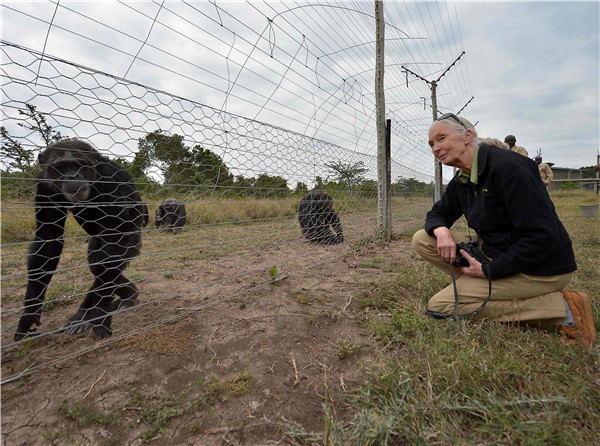Our brains can save us
 |
|
Goodall looks at rescued chimpanzees in July at the Sweetwaters sanctuary, Kenya's only great-ape sanctuary. [Photo provided to China Daily] |
So can birds.
Octopuses can slither out of tanks, slink into others to gobble fish and squish back into their own, pulling the lid closed behind them-humans none the wiser, until they review surveillance footage.
Clever creatures. Indeed.
Especially considering the mollusks don't have brains, per se.
This, says Jane Goodall, the household-name primatologist who discovered chimps use tools, makes it an amazing time for humanity's next generation to study animals.
And human intelligence can be the instrument by which we blunt ecological devastation, the Briton believes.
Goodall realized decades ago, upon observing the apes modifying natural objects to manipulate their environment-for instance, using sticks to extract yummy insects from the earth-that we needed to "redefine man, redefine tool or include chimpanzees with humans".
So, science did.
"It was very exciting for me because I was the first to learn about chimpanzees," she says.
But revolutionary discoveries about animal intelligence are generating new paradigms.
"In 1960, if I talked to the professors about, 'let's study the intelligence of the octopus', they would have laughed at me and locked me up as an insane person," she says.
"Now, there's huge interest because octopuses are incredibly intelligent, and they can solve problems. Crows ... can make tools. They can do things even some primates can't."
But experts for decades believed birds' brains' dissimilar structures meant they weren't capable of intelligence, she points out.
"So, it's a very exciting time for young people to go out there and learn about animals."
Bumblebees were recently taught to pull strings to earn a reward. More strikingly, others replicated the procedure after observing it, she points out.
Goodall, who made the journey to Tanzania's forests as a young woman without formal training, is celebrated for revolutionizing our understanding of our species' closest kin. But her methods weren't without criticism, especially giving names rather than numbers.
"(Numbers) make them objects of study rather than living beings. So, to me its very, very important, if it's possible, to know them as individuals, to name them and describe them," she says.
They may not be people, yet have individual personalities. They share emotions like joy and sadness, she discovered. They're capable of empathy.
Goodall first documented chimp warfare.
"(It's) not only learning about the primate but also learning from the primate. There's a difference," she explains.
"It's more a humility. I have a lot to learn."
Goodall left the chimpanzees she loved decades ago-to save them.
She saw, while flying over Tanzania's Gombe in the early 1990s, deforestation had shaved surrounding forests bald.
That changed everything.
She realized: "You cannot do animal conservation unless you do people conservation."
Protecting nature requires sustainable development that produces solutions for humans who share other species' habitats, she understood.
Goodall soon after led the successful movement to reforest the area and improve locals' living standards.
But her battle is global.
















